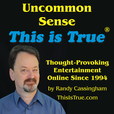
Summary: In This Episode: The “little things” matter — a lot. Right down to making the world a better place for generations to come, and they’re easy to do. And really: if a 5-year-old is obviously starting to develop Uncommon Sense, anyone who puts their mind to it can develop it too.<br> <br> <a class="twitter-share-button" href="https://twitter.com/share?ref_src=twsrc%5Etfw">Tweet</a><br> <a href="#transcript">Jump to Transcript</a><br> <a href="https://thisistrue.com/category/podcasts/">How to Subscribe and List of All Episodes</a><br> Show Notes<br> <br> * Links for the two studies I mentioned about the benefits of reading: <a href="https://www.sciencedirect.com/science/article/pii/S0049089X18300607">Science Direct</a> and <a href="https://openresearch-repository.anu.edu.au/handle/1885/19165">Open Research</a> (abstract only).<br> * Moved to contribute books to Logan’s Little Library? Since he has an overabundance, might I suggest you find a <a href="https://littlefreelibrary.org">Little Free Library near you</a> instead? Or (gasp!) even consider starting your own!<br> * Wikipedia’s biography of <a href="https://en.wikipedia.org/wiki/Andrew_Carnegie">Andrew Carnegie</a> explains his support for libraries.<br> * My own photo of Little Free Library in Colorado:<br> <br> <a name="transcript"></a><br> Transcript<br> We’ve heard a lot of examples in prior episodes of little things making a big difference. In this case, we start with a little boy — a very young child. You can see the glimmers of Uncommon Sense that early: you’ll see what I mean. And then I’ll widen out into a bigger picture. Meanwhile, seriously: if a 5-year-old is obviously starting to develop Uncommon Sense, anyone who puts their mind to it can develop it too.<br> Welcome to Uncommon Sense, I’m Randy Cassingham.<br> Logan Brinson’s family moved to Alpha, Illinois, in 2017, “and one of the first things we noticed,” says his father, Brandon, “was the local village didn’t have a library.”<br> Logan may only be 5, and is only in pre-school, but he already loves books. And by the way, books are a great path to developing Uncommon Sense. A study published last month in Social Science Research says a “growing body of evidence supports the contention of scholarly culture theory that immersing children in book-oriented environments benefits their later educational achievement, attainment and occupational standing.” Not just for literacy, they say, but “numeracy” and “technological problem solving.” So much so, they found, that “Bookish adolescents with lower secondary education credentials become as literate, numerate and technologically apt in adulthood as university graduates who grew up with only a few books.”<br> If that sounded like academic gobbly-gook, let me summarize: Just having an affinity for, and being allowed access to, books can actually get kids up to par with non-book-loving college graduates. Now: imagine combining the two. I’ll link to that study on the Show Page.<br> Oh, and notice I’m not saying “textbooks” here. Even literary novels help expand the mind, improve vocabulary and learning, and spark creativity and, yes, achievement.<br> And that study was not any kind of fluke. Another study from 2010 showed that kids who grow up in homes with books get as much advantage from them alone — that is, even if they have uneducated, even illiterate parents — as they would from having educated parents. And not just in the United States: that study looked at kids in 27 different countries, and found, “It holds equally in rich nations and in poor; in the past an...
